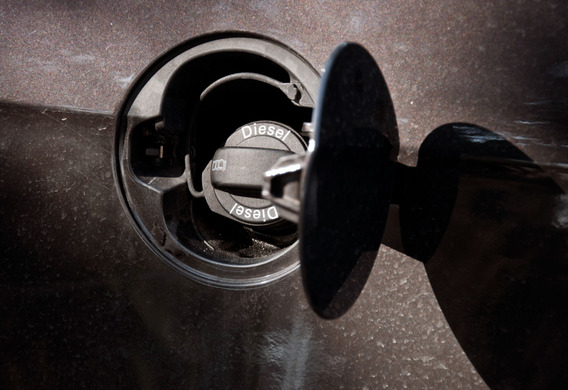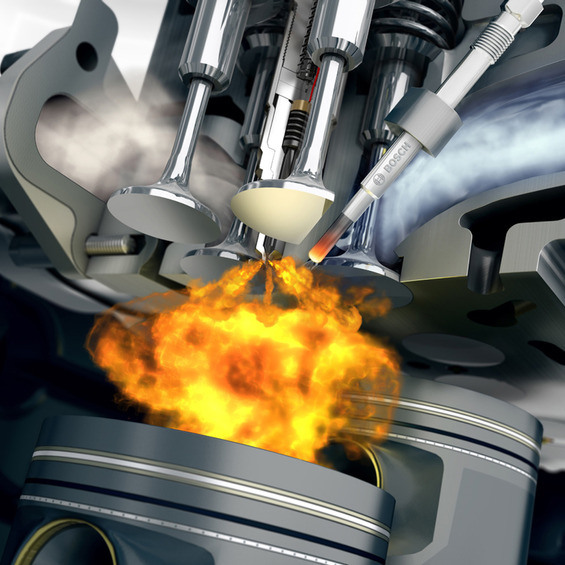
Description of diesel fuel
Diesel-liquid petroleum product used as a fuel for internal combustion diesel engines. Diesel fuel is often referred to as "solarium" (from German Solaröl-solar oil). This is a more heavy faction than petrol, which is formed in the process of a direct oil refining. Physically, diesel fuel is difficult to evaporate, relatively viscous liquid of yellowish color, similar to liquid motor oil.

History of diesel fuel production
Diesel is a relatively young type of fuel. The great need for inexpensive liquid fuel for engines was created during the industrialization of the late XIX-early twentieth century, in an era of intensive development of mechanical engineering. A special interest in the search for new affordable fuels appeared during the First World War, which could be won by a country with a large number of resources, including energy.
Rudolf Diesel was the first to find the use of heavy oil.
Scientists around the world understood that the new type of fuel should be liquid, since the invention of the mechanism of efficient and uninterruptable supply of dry fuel to the engine presented an even bigger problem than finding new types of fuel.
Rudolf Diesel was the first to find the use of heavy oil. The engine cylinder was invented in the cylinder by clean air, and was sprayed later, after compression. It was because of this fact that the heavy fuel in the hot air was as effective as lighter fuel. This is the first step towards the creation of diesel engines, which we are now actively using.
Initially, diesel was used along with petrol. However, after the fuel and energy crisis, humanity noted that, thanks to the construction of diesel engines, fuel burns more fully and therefore more efficiently. It is this that we owe to the modern distribution of diesel engines and their use in passenger cars.
At an early stage, diesel engines were unwieldy, relatively low-powered, smoky and noisy. Over time, however, these shortcomings have been eliminated, including through the work on the improvement of diesel fuel. A major step in this area has been the invention of various additives to help improve the quality of diesel fuel, as well as the development of new cleaning methods.
Diesel fuel types
In the process of oil refining, three types of diesel fuel are produced: summer, winter and Arctic. The difference between them is the density and the so-called flash-point. The denser fuel, the easier it is. A paraffin is able to lock the fuel line in the filters.
One of the latest developments in the development of diesel fuel was its production from plant materials
The summer diesel fuel is used at a temperature above 0 ° C, as it starts at 5 ° C. A winter solace is used at a temperature of not less than -30 ° C (freezing at -35 ° C). The Arctic fuel is generally used in extreme conditions at an ambient temperature of not less than -50 ° C (a freeze temperature of -55 ° C).
Alternative forms of diesel fuel
One of the latest developments in the development of diesel fuel has been its production from plant materials. If it is possible to find inexpensive raw materials for bioethanol production, diesel fuel will become relatively cheap and environmentally friendly.
The fuel is now mostly made of raps, but sometimes as raw materials use palm oil or algae.
Diesel fuel plus and minus
Diesel fuel is characterized primarily by fuel efficiency. When combustion is relatively high, a large amount of heat is released-when the use of diesel oil is used, the savings can reach 20-30%. Another positive feature of diesel fuel is the low flammability rate, which makes fuel relatively safe, especially compared to petrol.
It was once thought that diesel engines had great noise, but now it is almost impossible to distinguish diesel engine from petrol
At the moment there is a struggle for the production of diesel fuel with low sulphur content, and modern diesel fuel, if the engines are used with catalysts, are practically safe for the environment. It was once thought that diesel engines had great noise, but thanks to the new system of high blood pressure Common Rail, it is almost impossible to distinguish a modern diesel engine from petrol.
The main drawback of diesel fuel has always been, and is, exposure to changes in the reduction of ambient temperature. The replacement of summer propellations in winter is a compulsory condition for diesel engine operation, otherwise it will simply not start. Even if winter fuel is used at low temperatures, the engine may be difficult to run without preheating.
Poor diesel oil (with high sulphur content) tends to react chemically with motor oil. That is why, in the recommendations of the majority of diesel engine manufacturers in the countries, for example, the CIS still contains an instruction that the oil should be changed much more often than in other regions, since the sale of poor fuel is still common.
The deficiencies in the use of diesel fuel include more expensive maintenance and repair of engines that require greater precision in the manufacture of higher compression cylinders.
Diesel fuel considerations
The use of diesel fuel with low sulphur content requires a high quality anti-tolerable additive.
Sulphuric compounds and water create an aggressive environment in which sulphuric acid is formed at high pressure. To avoid the engine failure, periodically replace fuel filters and monitor the condition of oil, catalysts and particulate filters
Another diesel engine is a mixture of water. In the event of water entering the fuel, water jams that block the work of the engine are formed. The most modern fuel systems use filters with separators that separate the water and collect it in the reservoir for the subsequent discharge.
bacteria and microalgae can be located and reproduced in diesel fuel. With the active reproduction, they may clog and completely disable the fuel system. But before applying the means to combat micro-organisms, it is necessary to make sure that they do not adversely affect the quality of the diesel fuel.
The filter (if any) and the fuel tank should be regularly sucked out of the filter.







